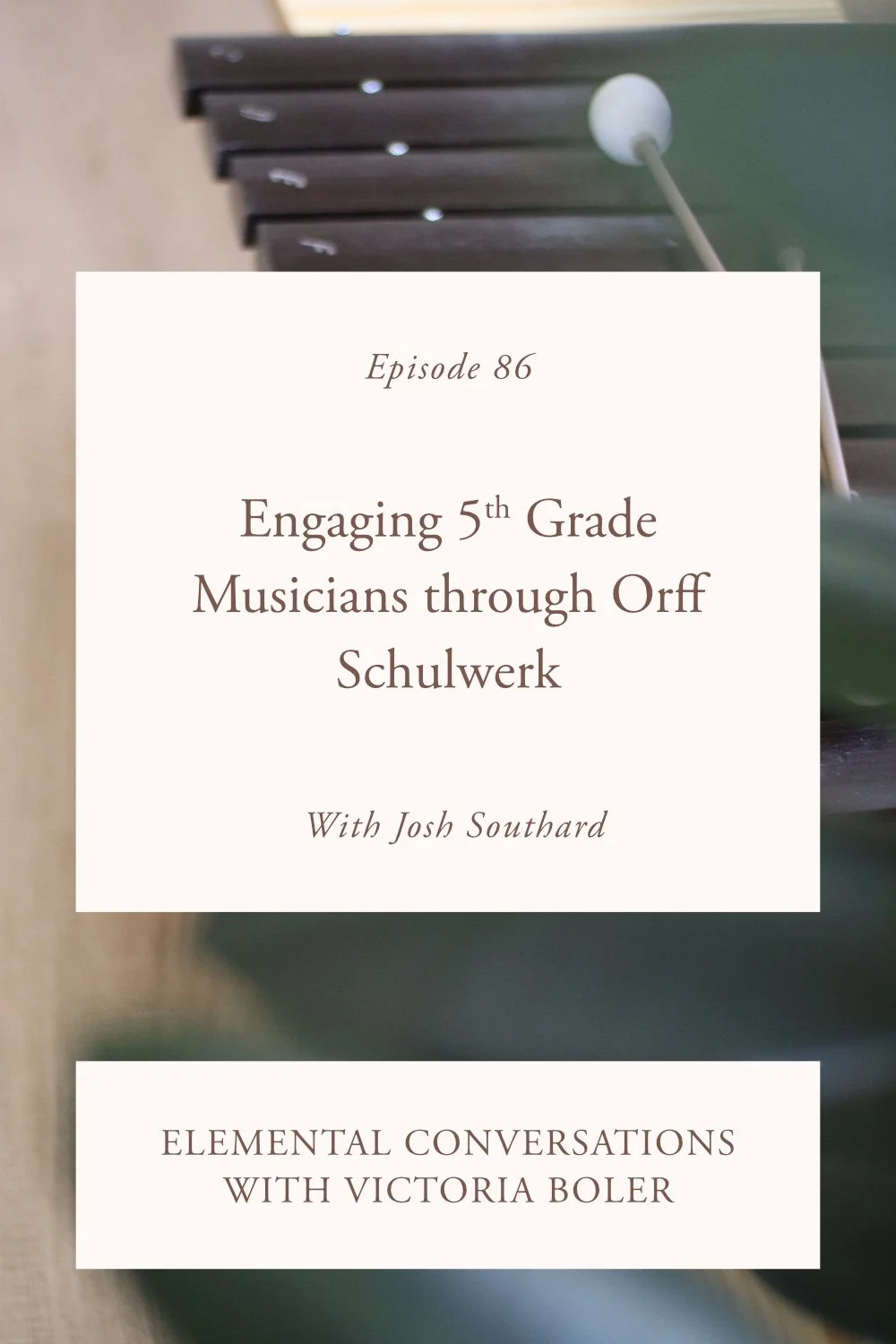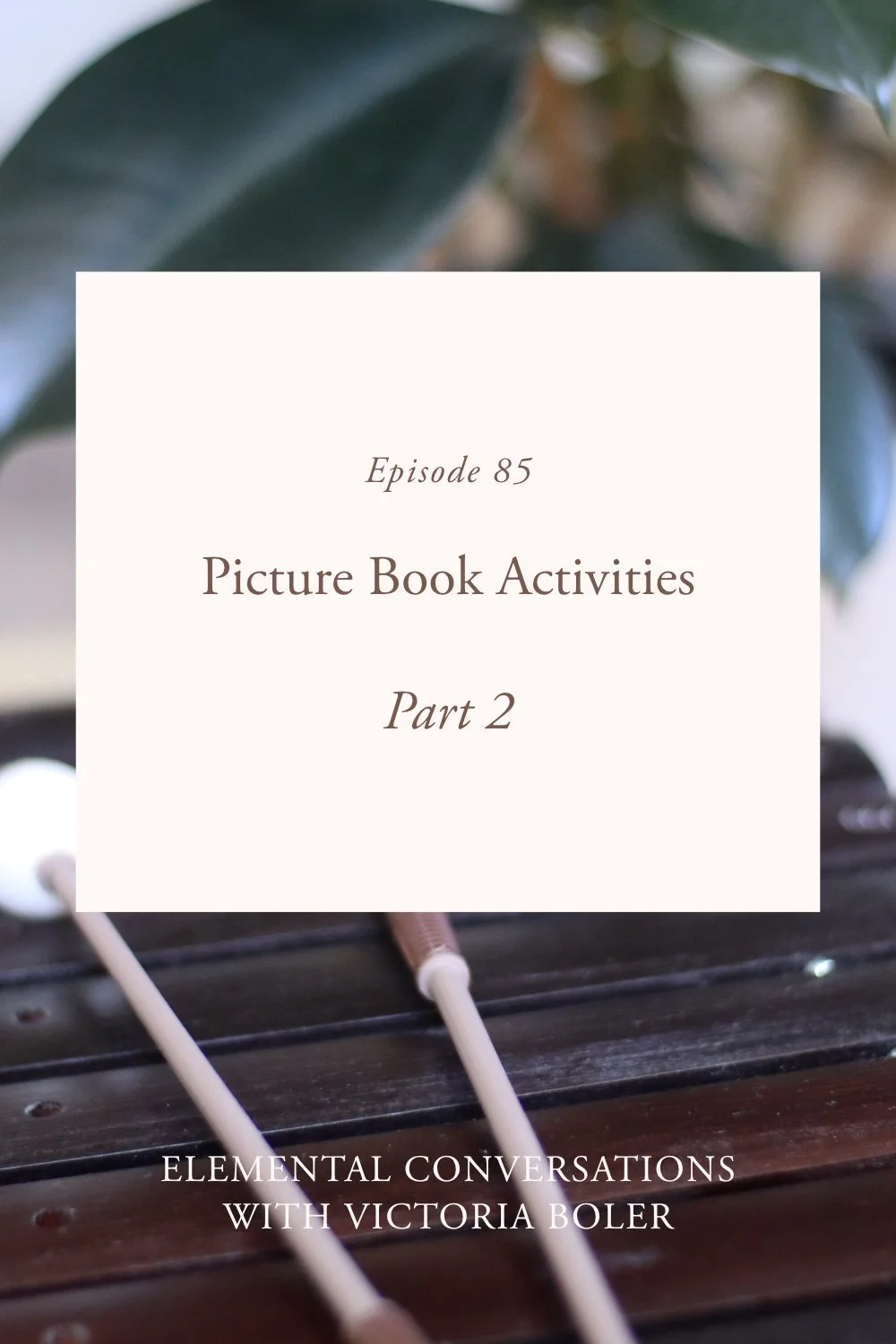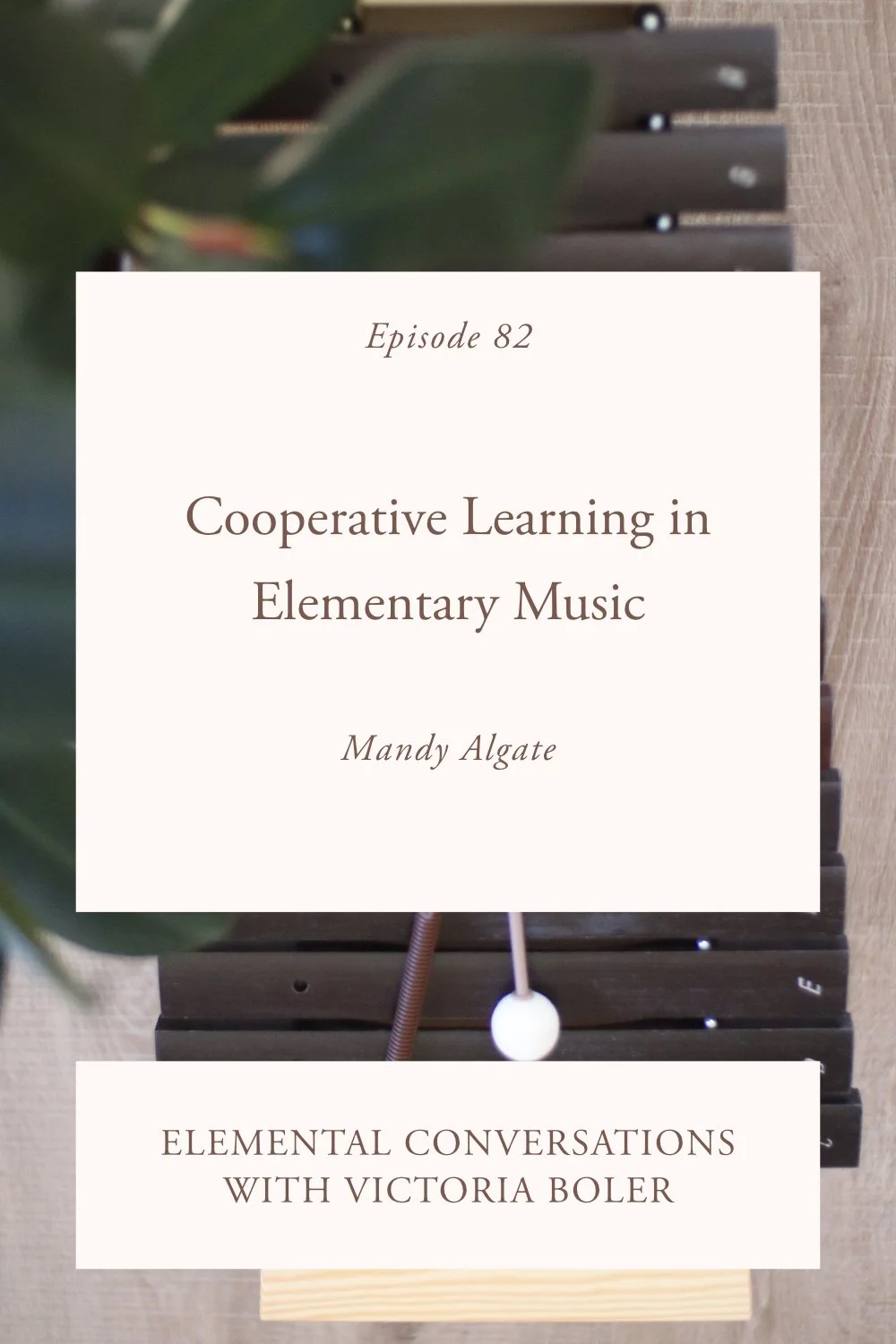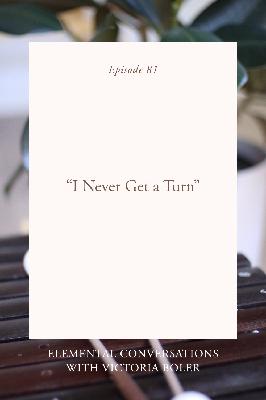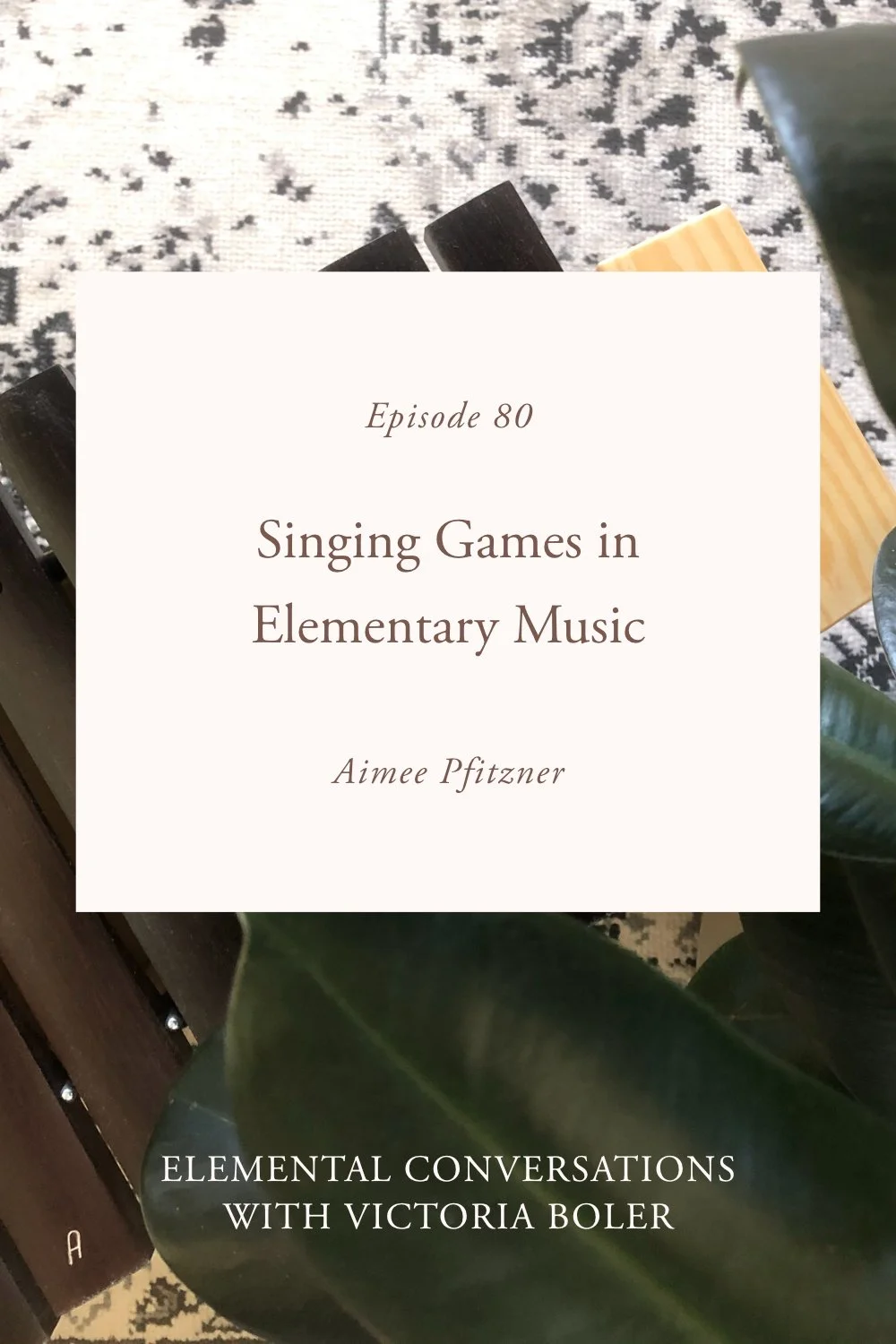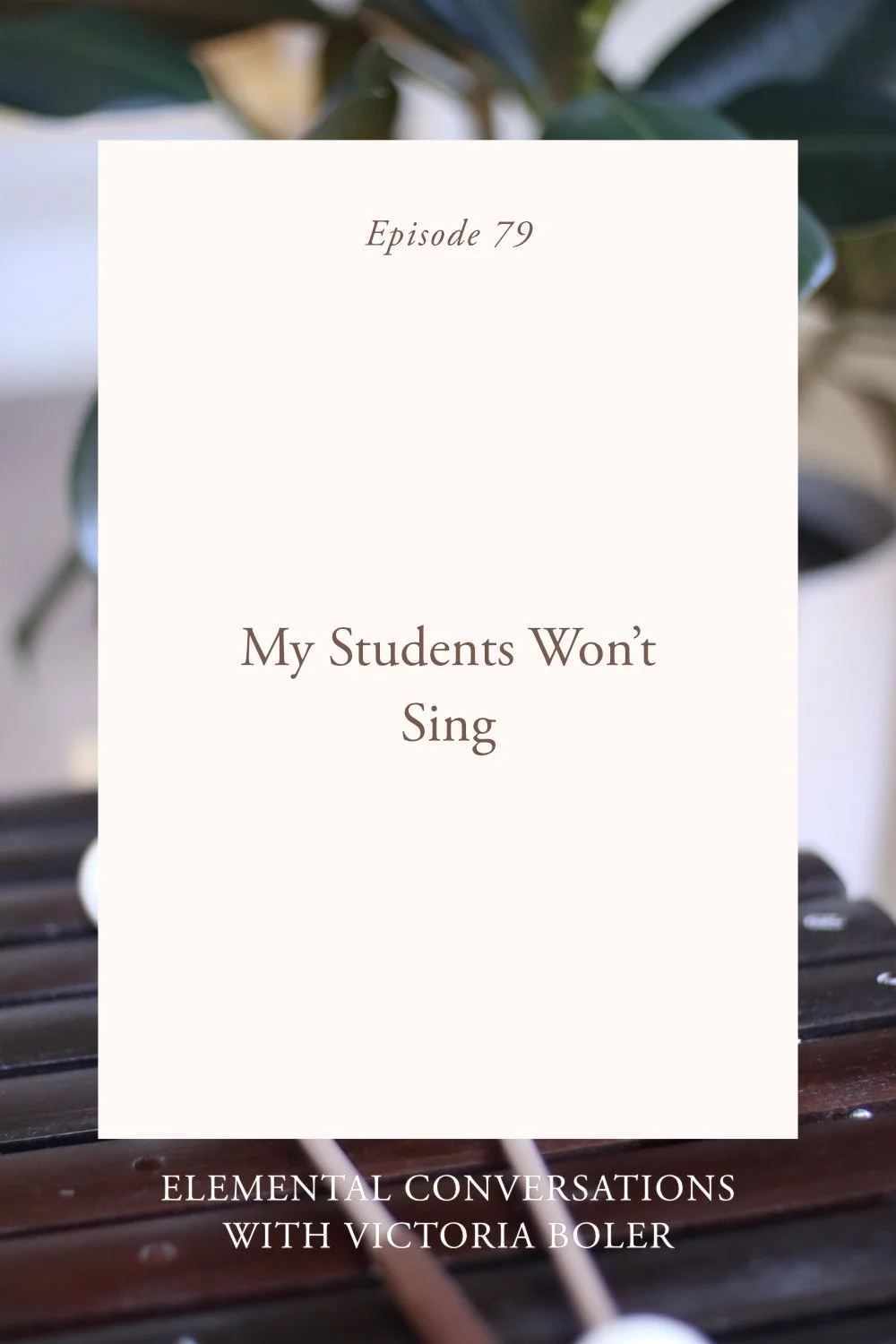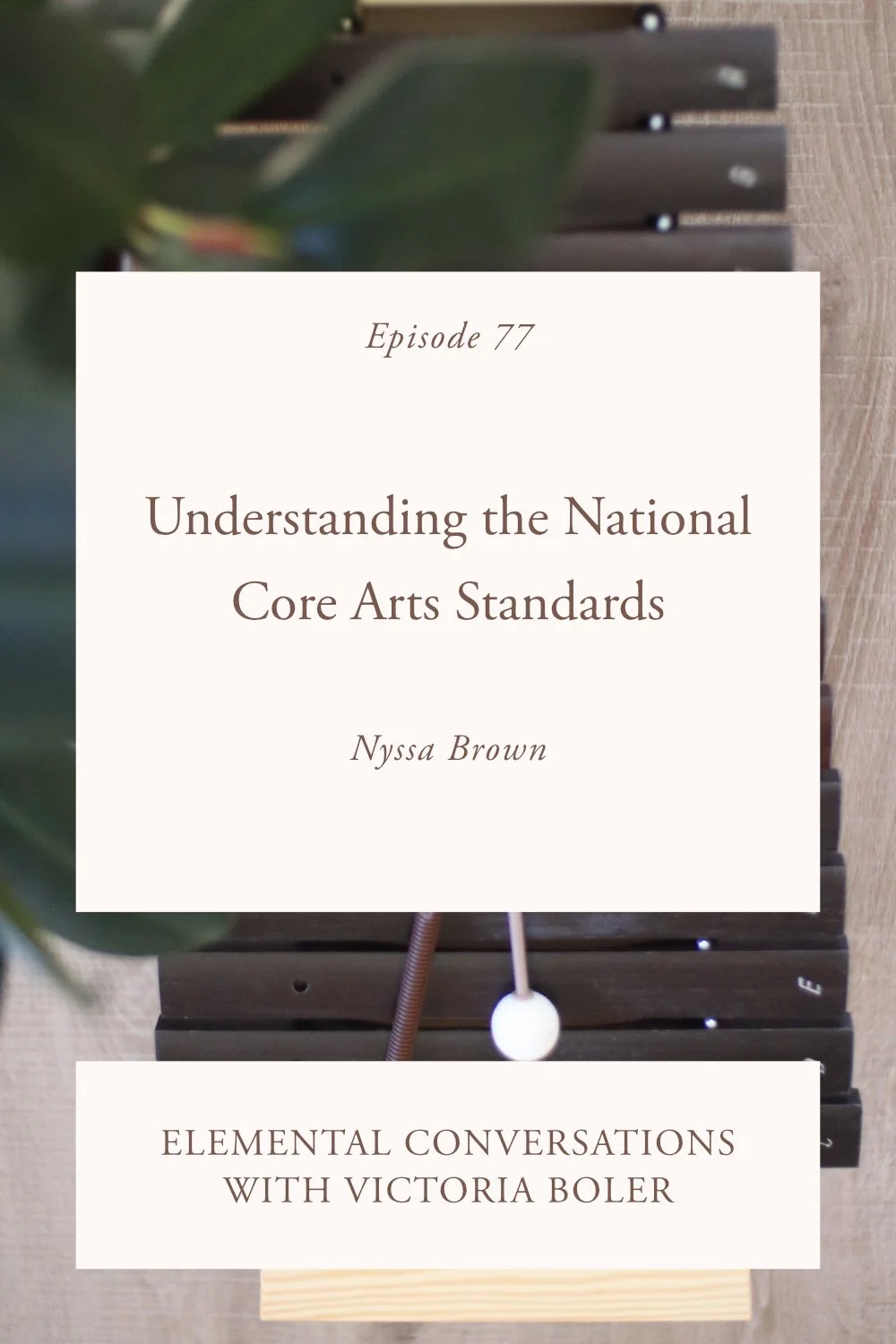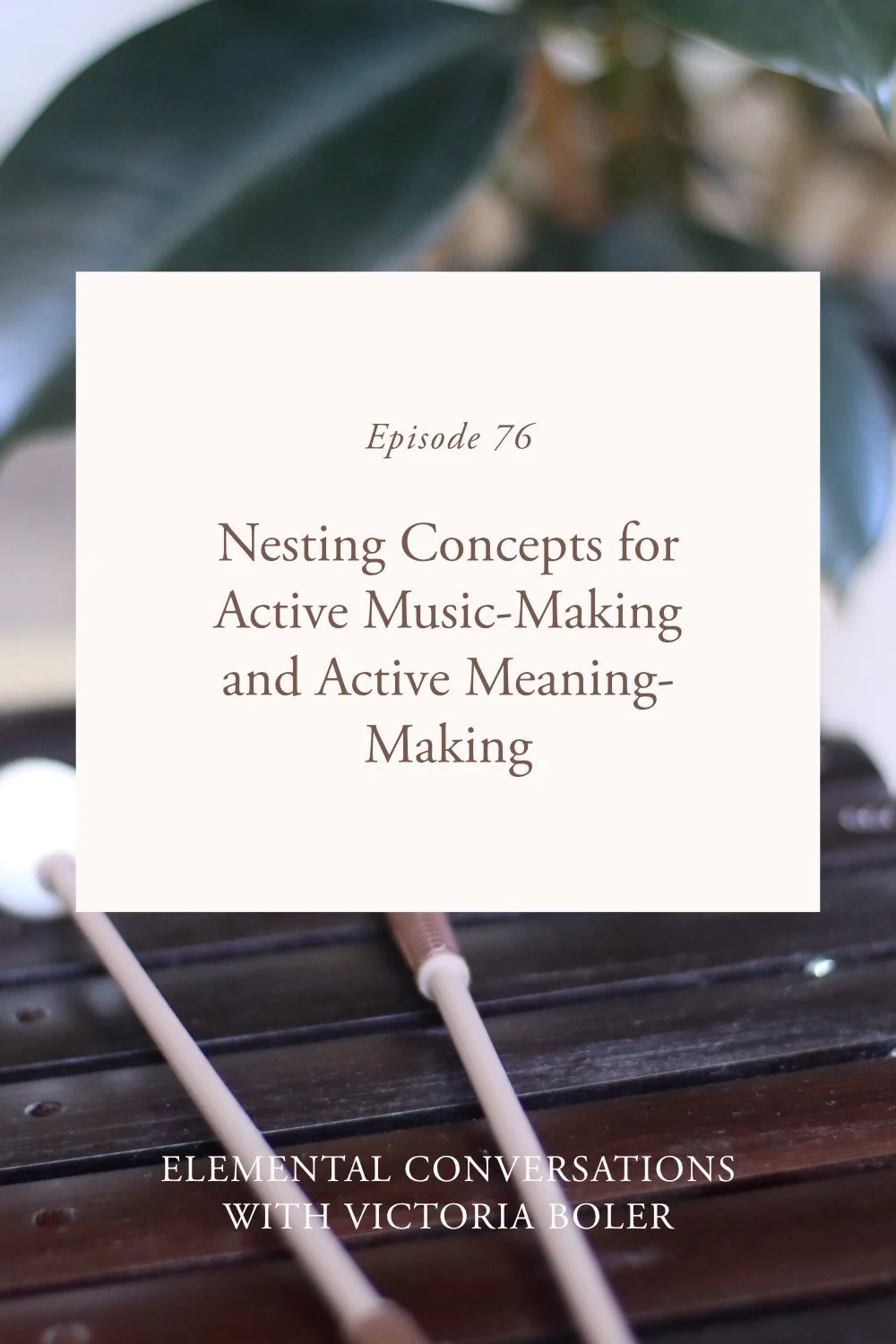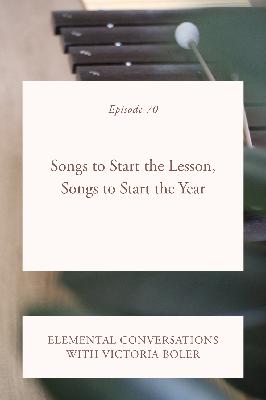Discover Elemental Conversations with Victoria Boler
Elemental Conversations with Victoria Boler

84 Episodes
Reverse
Full Show notes:victoriaboler.com/podcast/5th-grade-orff-josh-southardIt’s the one and only Josh Southard! In this conversation, Josh shares his approach to developing a thriving 5th grade music program where upper elementary musicians are engaged and involved.In This Conversation….00:00 - Josh Southard!01:45 - Orff Schulwerk in 5th Grade04:50 - Connecting with 5th Grade through play-based processes11:41 - Releasing ownership to 5th grade musicians18:26 - What does the Orff process look like?26:53 - Breaking down the process34:14 - Putting the pieces together45:44 - Increasing 5th Grade engagement52:12 - Where to connect with Josh---------------Let’s Connect: Website | Instagram | YouTube | Website | Planning Binder
Full episode notes here: https://www.victoriaboler.com/podcast/In episode 83 we explored a few simple ways to start using picture books in elementary general music.When we’re ready for more involved activities, and perhaps extended projects, what are some options? Here are a few places we can get started.Let’s think though some opportunities for student arranging, adding a game, exploring creative movement, and expanding partwork skills.In This Episode…00:00 - Picture Books in Elementary Music00:56 - Student Arranging“Too Many Pumpkins”04:09 - Add a Game!“Fourteen Animals That Are Definitely Not an Octopus”08:16 - Creative Movement“Lines that Wiggle”11:42 - Partwork Activities“The Chilly Penguin”“The Stick”15:33 - Wrapping Up---Let’s Connect: Website | Instagram | YouTube | Website | Planning Binder
Full Show notes:victoriaboler.com/podcast/folk-song-research-kathy-kuddesIn This Conversation…. 00:00 - Kathy Kuddes!01:27 - What is folk song research? 03:41 - Questioning the “music teacher canon” 13:18 - What is a folk song? 18:29 - Planning what to leave out 22:02 - What to look for in song resources31:29 - Print resource recommendations 39:34 - Getting music off the page (“Hop Old Squirrel”)45:05 - Digital resource recommendations 48:12 - Where to get started with song research 55:20 - How to connect with Kathy ---------------Let’s Connect: Website | Instagram | YouTube | Website | Planning Binder
Full episode notes here: https://www.victoriaboler.com/podcast/picture-books-in-elementary-music-part-1---Ready to dip your toe into the magical world of children’s literature in your music classroom? Today we’ll talk about a few ways to get started. Next time, we’ll extend the conversation to a few more involved options.How will we choose our books? What activities will we use? Where will the musical material come from? Let’s explore together.In This Episode…00:00 - Getting Started with Picture Books in Elementary Music00:53 - Three Elemental Questions01:40 - What are we showcasing? What’s the point?04:00 - What is the student’s job? What is the teacher’s job?06:21 - Choosing a Book10:27 - Where does the musical material come from?11:09 - Songs from Inside the BookVictoria’s Collection: Picture Books to Sing on Epic Books12:26 - Creating Musical Text from Inside the Book“The Stick”“Turtle Walk”15:00 - Adding Existing Songs to the Book“What Do You Do with an Idea?”21:10 - Recap and What’s Next---Let’s Connect: Website | Instagram | YouTube | Website | Planning Binder
Full Show notes:victoriaboler.com/podcast/cooperative-learning-elementary-music-mandy-algateIn This Conversation….00:00 - Mandy Algate!01:24 - What is cooperative learning?03:43 - How Mandy got interested in cooperative learning06:08 - How Mandy started incorporating cooperative structures08:43 - What are the Kagan structures?09:13 - “Quiz Quiz Trade” with “Ickle Ockle”13:13 - “Early in the Morning” for upper elementary16:36 - Cooperative, not competitive19:09 - Facilitating mixed skill levels and adapting for different grades29:21 - Late practice activities37:53 - Quick response questions about cooperative learning45:15 - Final thoughts47:19 - Connecting with Mandy, Kodaly levels---------------Let’s Connect: Website | Instagram | YouTube | Website | Planning Binder
It’s a common phrase we’ve heard before, and it takes a few different forms…. She always goes first He only picks his friends I wanted the blue scarf…What’s our goal in a singing game where we take turns? What happens when we’re not “it” or we don’t have the shiny special role? Let’s think about…. What our goal is What skill is missing When we can practice it ——-In This Episode…00:00 - “I never get a turn”02:54 - What is Our Goal? 06:45 - What’s the Musical Skill? 007:57 - Locus of Control 10:34 - When do we Practice the Skill? 11:44 - Examples of Practice ——-Let’s Connect: Website | Instagram | YouTube | Website | Planning Binder
Show notes here: https://www.victoriaboler.com/podcast/aimee-pfitzner-singing-games ——I’m thrilled to be sharing this conversation with Aimee Pfitzner, all about singing games in elementary general music. If you’re already familiar with Aimee you’ll know she has so much knowledge and she brings so much experience to the world of children’s games and children’s play. If you don’t already have them, let me recommend her books, which you can find with the link above, along with Aimee’s bio so you learn more about her and connect with her work. Aimee and I started talking before the actual interview about her experience moving to her North Carolina campus, and she was sharing so much wisdom I decided to keep it in our recording. So we’ll just jump straight into our conversation as Aimee shares how she got introduced to the Schulwerk. Here is Aimee talking about her early Orff experiences. In This Episode…00:00 - Aimee Pfitzner & how Aimee got connected to the Orff Schulwerk04:44 - Creating musical moments 08:42 - How do we choose singing games for the classroom? 14:01 - the Orff sequence 18:06 - Bump Up Tomato 25:52 - We Are Dancing in the Forest 28:45 - Pacing and taking turns33:06 - Classroom management in singing games 35:39 - Adapting songs and games 38:13 - Aimee’s favorite singing games 49:41 - Aimee’s books52:29 - Closing thoughts —— Let’s Connect: Website | Instagram | YouTube | Website | Planning Binder
What are some ways to think about a situation where students don’t sing?This is a big topic, because there are lots of different reasons that students might not sing, and non-participation can take a lot of different forms! Let’s think about some ways to frame the problem, and some questions to ask as we move toward a solution. ———-In This Episode…00:00 - My students won’t sing 02:25 - Umbrella Understandings 03:21 - We can’t see motivation05:22 - We like our students, and our students like us 05:40 - We have consistent routines and procedures 07:02 - We have good relationships with our colleagues 08:23 - This is normal, and we can probably relate 14:33 - What does musicing look like and sound like? 20:09 - Whose music is this? 23:54 - Have we constructed the right task? 25:39 - Activities for scaffolding up 34:54 - Activities for scaffolding down 39: 06 - What’s our experience with managing discomfort? ——————Find the full show notes at https://victoriaboler.com/elemental-conversations Let’s Connect: Website | Instagram | YouTube | Website | Planning Binder
We’ve all been there! We teach a song, only to find that students haven’t learned it exactly right. Let’s brainstorm a few possible approaches to the inevitable situation of students singing a song inaccurately. ——In This Episode…00:00 - When Students Sing a Song Inaccurately 01:28 - Elemental Questions02:52 - What is the point of the song? 07:31 - How do we build an aural context? 10:04 - Creative listening 14:27 - Listen and move 19:31 - What do students do? What does the teacher do? 28:41 - Troubleshooting38:20 - Wrapping Up——Find the full show notes at https://victoriaboler.com/elemental-conversations Let’s Connect: Website | Instagram | YouTube | Website | Planning Binder
Full Show notes: https://victoriaboler.com/elemental-conversations In this Conversation…. 00:00 - Intro01:27 - About Aileen04:05 - Benefits of centers08:33 - Should we do one concept or more than one concept in our centers? 12:38 - Aileen’s “formula” for center categories20:11 - Setting up for success26:45 - Choices, classroom management, and assessment : What to think about and options for structuring 32:45 - Centers for student choice: keeping it manageable and giving students ownership 41:53 - Scaffolding centers throughout grade levels44:33 - Centers for band and choir 48:30 - Final thoughts and advice from Aileen: Giving grace 50:43 - Aileen’s centers course 52:00 - Where to connect with Aileen
01:44 - Nesting Concepts in Elementary General Music10:10 - Areas of Balance through Tension 12:16 - Emphasizing Music 12:18 - Emphasizing the Child Over the Curriculum Document 15:07 - Emphasizing a Functional Classroom 17:51 - Possible Applications 18:59 - Transferrable Understanding 1: Ensemble 27:05 - Transferrable Understanding 2: Complement 34:07 - Where to Read More
Find the full show notes: victoriaboler.com/podcast/starting-from-scratch-in-2nd-and-3rd-grade-musicToday we’re thinking through what it can look like to start at the beginning of the music sequence with our 2nd and 3rd grade musicians. It can sometimes feel like these students are overlooked with teaching materials intended for both Kindergarten / 1st grade, and older beginners. Let’s take a look at a possible roadmap for the first several months of the 2nd and 3rd grade school year when these musicians are starting “from scratch” at the beginning of the sequence. In this Episode: 00:00 - Intro, framing the conversation 03:40 - Elemental Questions04:19 - Skip to the end - a quick roadmap 08:31 - What’s the point of a sequence? 14:27 - What makes something a 2nd or 3rd grade song? 20:30 - What are 2nd and 3rd grade students like? 28:26 - A possible roadmap for 2nd and 3rd grade beginners
If your year is just starting and your voice is already feeling tired, I know you'll appreciate all the wisdom Dr. Caitlin Moore has to share about vocal health for music teachers! Over the summer Dr. Moore took time out of her day at Interlochen Summer Arts Camp to talk about vocal care, vocal fatigue, vocal mechanisms, and much more. Read about Dr. Moore and get in touch with her here: victoriaboler.com/podcast/2023/9/12/vocal-health-for-music-teachers-dr-caitlin-mooreIn this episdoe…. 00:00 - Intro02:00 - Dr. Moore’s work and story 09:30 - Soprano vs Alto Distinctions 11:20 - Tessitura and Passaggio14:00 - What is “mixed” voice? 17:46 - Speaking and Singing with Tension in the Classroom 19:40 - Value of a Laryngologist21:36 - Body Awareness, Amplification, and Tension 29:52 - Habit Stacking 32:38 - The Tongue, Tongue Tension, and Tongue Release Exercises 43:48 - When Your Voice Feels Fatigued… 51:25 - Where to Find Dr. Moore
Metric counting…. notation-based…. beat based…. What is the deal with these counting systems? Where did they come from?And why takadimi? As we look into some elemental questions around takadimi, we see that most of us are starting from the same set of core values. The differences in our choices come down to how we answer a few elemental questions: 1. What is the role of the symbol in a sound-before-symbol approach? 2. What do we want to emphasize? 3. What is the best communication system for the ensemble we’re working with? Find the show notes and references here: https://victoriaboler.com/podcast/why-takadimi——————————————00:00 - Takadimi03:47 - Elemental Questions04:32 - Why Takadimi? TL;DR10:20 - Beat-based system vs notation-based11:36 - What is sound before symbol? 14:43 - What do we want to emphasize? 16:40 - History of rhythm syllables in Western music education 17:02 - French Time Names19:09 - Branches of off of French Time Names21:22 - Kodaly syllables 22:07 - North American Kodaly syllables24:12 - Gordon 25:22 - Takadimi27:31 - Arguments for and against beat-based systems 28:41 - “We want to prioritize sound to symbol” 29:56 - “Too many names makes everything confusing”32:39 - “We use moveable do, so it only makes sense to use ____”35:23 - What works best for the ensemble? 36:43 - Wrapping up, moving forward
This is such a great conversation with my friend, Matthew Stensrud! We talk about structuring the first elementary general music experiences of the year through the lens of Responsive Classroom.Find Matthew’s bio and connect with him here: https://victoriaboler.com/podcast/responsive-classroom-for-the-beginning-of-the-music-year-matthew-stensrud In This Episode: 00:00 - Intro 01:35 - What is Responsive Classroom?04:45 - “Misbehavior” through a Responsive Classroom Lens07:00 - Holding Boundaries During Inappropriate Behavior (3 Steps)10:16 - Following up with Positive Interactions 12:16 - Responsive Classroom at the Beginning of the Year 15:07 - Opening Routine 18:31 - Teacher Language 27:35 - First Day Activities 31:11 - Structured Choices 34:51 - Closing Routine & Reminding Language39:50 - Beyond the First Day41:37 - Procedures to Have in Place 44:11 - How to Connect with Matthew
Let’s think through some ways to set the tone for learning - both at the beginning of the lesson and at the beginning of the year. Additional Podcast Episodes:Opening the First Day of Music - An Elemental Conversation with Anne MileskiClassroom Management for Elementary General Music (Before the Sticker Charts)Lower Elementary SongsEngine Engine Feeling Fine, It’s Music Time Hey Betty Martin Caballito BlancoAll Around the ButtercupUpper Elementary SongsTo Stop the TrainBonjour, Mes AmisWelcome Welcome Yonder Come DayPop Songs: Sunday Best, I’m Good, Best Day of My Life
Today I’m sharing an elemental conversation with the fabulous LeslieAnne Bird, all about setting up music room routines. We talk about how to know it’s time to think or rethink routines, and we go over some very specific pain points a lot of us experience in class - things like getting students into the learning space and starting class, lining up at the end, and other things during the actual lesson like passing out instruments. Read LeslieAnne’s bio hereThe Efficient Music Classroom: https://teachingwithorff.mykajabi.com/webinar-efficient-music-classroom
After the getting-to-know-you activities, after the name games, after the routines….. what’s next? How do we know where to start the year from a musical content perspective? How will we know what students remember? How can we review and make sure kids aren’t bored? What if we’re at a new campus and we don’t know what students have done? How do we take information from singing games in a way that’s usable?We probably all have at least a few of these questions, so let’s look at some possible ways to answer them. This episode is a continuation of two other conversations: This podcast episode with my friend Anne Milseki This post on the review and assessment process Today we’ll emphasize the data-collection piece of the process.
Join in on this conversation with my friend, Dr. Amanda Hoke! We talk about starting music at a new campus, where to begin instruction, her favorite games for older beginners, and the interwoven tie between curricular sequences and student relationships. Throughout the conversation, Dr. Hoke maintains that building connection with students is a higher priority than any musical achievement we could reach. Specifically at the beginning of the year, Dr. Hoke encourages us to get to know students - their interests, their strengths, and their backgrounds. Her parting advice of “breathe and feel your feet” is a mindful invitation that will serve us all well, regardless of where we teach this Fall.In this Conversation: (01:25) - Amanda’s Current and Previous Teaching Situations (09:20) - Feeling “Behind” with Older Students (14:27) - Starting Instruction with Upper Elementary (17:32) - Activities for Upper Elementary (24:55) - Listening with Your Eyes, Ears, and Body (27:13) - Where to Begin Musically (33:09) - “Middle” Elementary, 2nd and 3rd Grades(36:14) - Changing Sequence Directions(39:40) - Macro Concepts as the Actual Goal(41:33) - Doing things Differently From the Previous Teacher(46:46) - Advice from Dr. Hoke on Starting a New Campus
If you find that you sit down to plan and suddenly feel the urge to do the laundry and organize your cabinets instead of working on a scope and sequence…. if you spend more time scrolling for ideas and inspiration than working on lessons… if you’ve ever felt overwhelmed by the amount of resources you have for planning… or if you feel stuck and unable to make decisions because you’re waiting for inspiration… I think this is the episode for you. Show Notes: www.victoriaboler.com/podcast/i-get-distracted-when-i-sit-down-to-plan TIMESTAMPS (01:47) - What it’s Like to Plan the Year (04:40) - Too Much Noise in Planning (07:58) - Planning Strategies Overview(09:18) - Sticky Note Savior (12:12) - Come Back to This Comment(12:29) - Reframe: The First Six Minutes(16:15) - Just Keep Typing (19:09) - Reframe: There’s No Such Thing as Writer’s Block (21:13) - Summary (22:26) - Overwhelmed by Overwhelm


